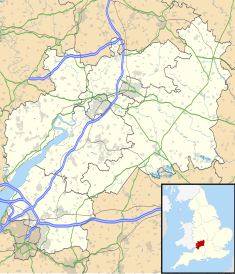
Torfaen is a county borough in the south-east of Wales. Torfaen is bordered by the county of Monmouthshire to the east, the city of Newport to the south, and the county boroughs of Caerphilly and Blaenau Gwent to the south-west and north-west. It is within the boundaries of the historic county of Monmouthshire, and between 1974 and 1996 was a district of Gwent, until it was reconstituted as a principal area in 1996.

Mitcheldean is a market town in the Forest of Dean in Gloucestershire, England.

The Market Hall, in Priory Street, Monmouth, Wales, is an early Victorian building by the prolific Monmouth architect George Vaughan Maddox. It was constructed in the years 1837–39 as the centrepiece of a redevelopment of part of Monmouth town centre. After being severely damaged by fire in 1963, it was partly rebuilt and is now the home of Monmouth Museum. At the rear of the building are original slaughterhouses, called The Shambles, opening onto the River Monnow. The building is Grade II listed as at 27 June 1952, and it is one of 24 buildings on the Monmouth Heritage Trail. The Shambles slaughterhouses are separately listed as Grade II*.

The Shire Hall is a municipal building in Fore Street, Hertford, the county town of Hertfordshire, England. The building, which currently serves as a Magistrates' Court, is a Grade I listed building.
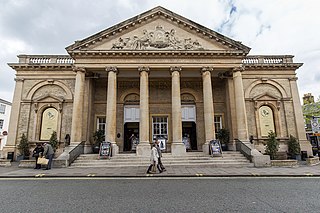
Corn exchanges are distinct buildings which were originally created as a venue for corn merchants to meet and arrange pricing with farmers for the sale of wheat, barley, and other corn crops. The word "corn" in British English denotes all cereal grains, such as wheat and barley. With the repeal of the Corn Laws in 1846, a large number of corn exchanges were built in England, particularly in the corn-growing areas of Eastern England.

Colchester Town Hall is a municipal building in the High Street in Colchester, Essex, England. The town hall, which is the headquarters of Colchester City Council, is a Grade I listed building.

Bideford Town Hall is a municipal building at the corner of Bridge Street and New Road in Bideford, Devon, England. The building, which is the meeting place of Bideford Town Council and is also used for some meetings of Torridge District Council, is a Grade II listed building.

Aylesbury Town Hall is a name which has been used for two different buildings in Aylesbury, Buckinghamshire, England. Since 2007 the name has been used for an office building at 5 Church Street, which serves as the headquarters of Aylesbury Town Council. The name was also formerly used for a complex of buildings which had been built in 1865 as a corn exchange in Market Square, and which served as the offices and meeting place of the local council from 1901 to 1968. The majority of the old town hall was demolished shortly afterwards, leaving only the entrance archway facing Market Square still standing, now called Town Hall Arches. This remaining part of the old town hall is a Grade II* listed building as part of the range of civic buildings on the southern side of Market Square including the old County Hall.

Bridgwater Town Hall is a municipal building in the High Street, Bridgwater, Somerset, England. The town hall, which was the headquarters of Bridgwater Borough Council, is a Grade II listed building.

Amersham Market Hall, formerly known as Amersham Town Hall, is a municipal building in the High Street in Amersham, Buckinghamshire, England. The structure is a Grade II* listed building.

Sandbach Town Hall is a municipal building in the High Street in Sandbach, Cheshire, England. The structure, which is the meeting place of Sandbach Town Council, is a Grade II listed building.

Saffron Walden Town Hall is a municipal building in the Market Place, Saffron Walden, Essex, England. The structure, which is the headquarters of Saffron Walden Town Council, is a Grade II listed building.

Alnwick Town Hall is a municipal building in the Market Place, Alnwick, Northumberland, England. The structure, which was the meeting place of the common council, is a Grade I listed building.
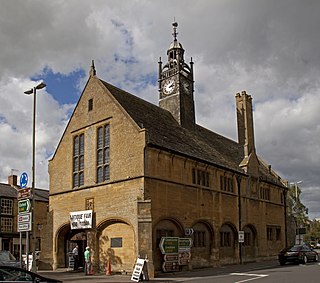
Redesdale Hall, also referred to as Moreton-in-Marsh Town Hall, is a municipal building in the High Street, Moreton-in-Marsh, Gloucestershire, England. The building, which is used as an events venue, is a Grade II listed building.

Tetbury Market House, also known as Tetbury Town Hall, is a municipal building in the Market Place, Tetbury, Gloucestershire, England. The building, which was used both as a market house and as a town hall until the late 19th century, is a Grade I listed building.

Painswick Town Hall is a municipal building in Victoria Square, Painswick, Gloucestershire, England. The building, which is used as an events venue and also as the offices of Painswick Parish Council, is a Grade II listed building.
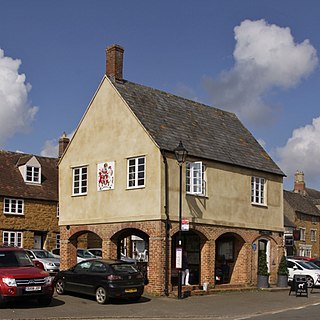
Deddington Town Hall is a municipal building in the Market Place in Deddington in Oxfordshire, England. The structure, which is used for community events, is a Grade II listed building.

Berkeley Town Hall is a municipal building in Salter Street, Berkeley, Gloucestershire, England. The structure, which is now used as a community events venue, is a Grade II listed building.

Kidwelly Town Hall is a municipal building in Lady Street, Kidwelly, Carmarthenshire, Wales. The structure, which was last used as a public library but is currently vacant, is a Grade II listed building.
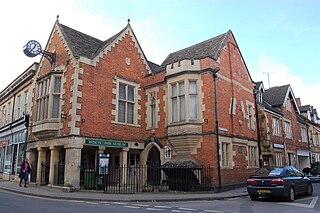
Winchcombe Town Hall is a municipal building in the High Street, Winchcombe, Gloucestershire, England. The structure, which accommodates the Winchcombe Folk and Police Museum, is a Grade II listed building.

